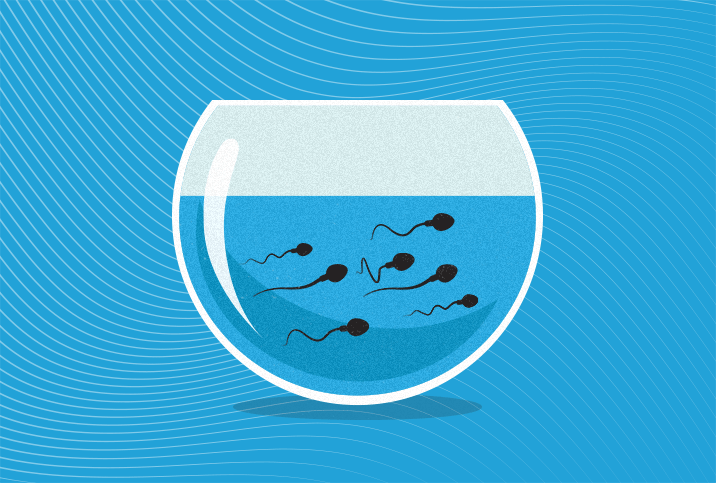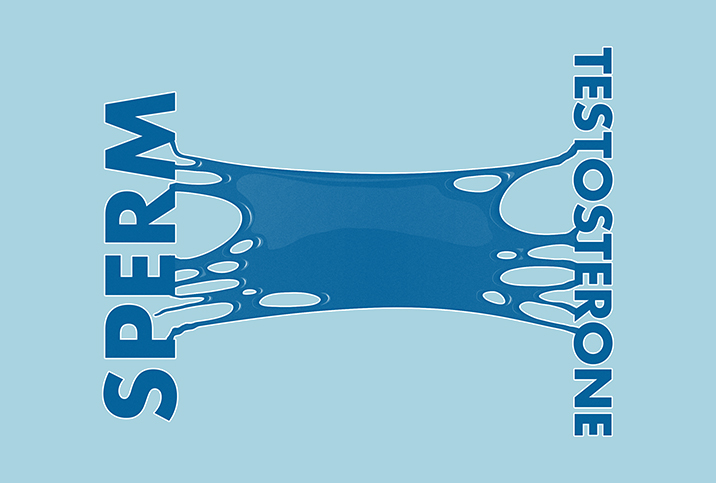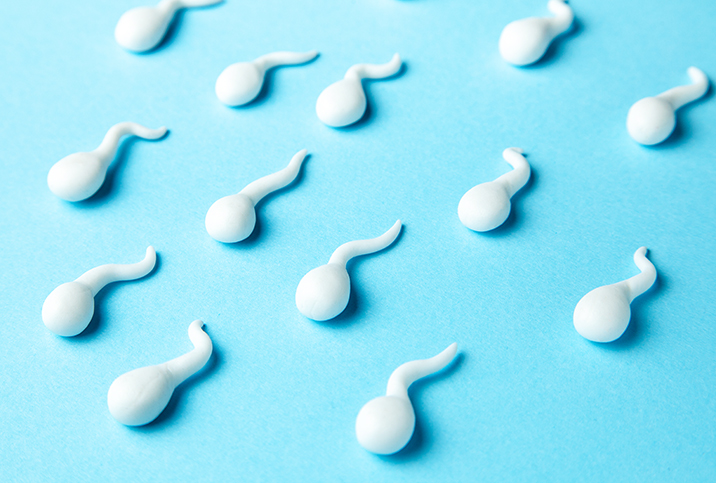The Vaccine Won't Affect Your Fertility, But COVID-19 Might

While the COVID-19 vaccine and male fertility have made headlines lately, there is no evidence as of now that the vaccine has any negative effect on male fertility. However, there is evidence indicating that contracting COVID-19 could make an impact.
So, where did the worry regarding the vaccine's potential impact on male fertility come from? Well, as the Henry Ford Health System in Detroit explained, it actually originated with concerns about women's fertility from Wolfgang Wodarg, an epidemiologist in Germany who, along with a former Pfizer employee, wrote a letter expressing his fears to the European Medicines Agency.
Both the Pfizer and Moderna vaccines use genetically engineered messenger RNA (mRNA). When the vaccine was in the infancy of its development, Wodarg theorized that because the spike protein the mRNA vaccines code for has a slight resemblance to the spike protein in the placenta that nourishes a fetus during pregnancy, it was possible the immune system response produced in a pregnant person from the vaccine could lead to an attack on the placenta.
'Of note, the orchitis [testicle inflammation], erectile dysfunction or negative impact to fertility has not been shown to be an adverse effect of the COVID-19 vaccines.'
We now know any similarity between the two genetic codes is impossibly small because the vaccine does not cause the immune system to attack a pregnant person's placenta. More importantly, we have studies and data that have led all leading health organizations to recommend the COVID-19 vaccination as safe, even during pregnancy.
However, the myth and hesitancy surrounding the vaccine and its potential impact on fertility has continued to swirl, eventually making its way into the realm of male reproduction.
"No one is sure how the myth that COVID vaccines impact [male] fertility began," said William Thieu, M.D., M.S., a urologist at Santa Clara Valley Medical Center in San Jose, California. "Studies have shown that immediately after the Emergency Use Authorization was initiated, a multitude of internet searches began on COVID, vaccine and fertility, with some increasing by over 2,900 percent. The increased interest in the topic may have spawned misinformation outlets to capitalize on the newfound attention for financial gain."
The sperm counts speak for themselves
The increased interest—and the fact that reproductive toxicity wasn't specifically studied in vaccine trials—led to a spotlight on how COVID-19 vaccines could impact male fertility.
The gold star study, so far, was published in June 2021 in JAMA, the Journal of the American Medical Association. The study specifically observed the volume of sperm production in men ages 18 to 50 before and after they received the vaccine and found there was no change in sperm production following administration.
The findings were also reassuring beyond simple sperm parameters, said Ranjith Ramasamy, M.D., director of reproductive urology and associate professor at the University of Miami Miller School of Medicine, and one of the study's authors.
"Of note, the orchitis [testicle inflammation], erectile dysfunction or negative impact to fertility has not been shown to be an adverse effect of the COVID-19 vaccines," he said.
Although the study was small, involving only 45 men, Ramasamy said it's the largest one of its type so far and the results were clear: The vaccine had no impact on sperm parameters.
However, studies have demonstrated a clear association between COVID-19 infection and a negative impact on the male reproductive system.
What could impact your fertility? The virus
The studies on the impact of COVID-19 and male fertility are still ongoing, but they aren't looking good for men so far. For instance, a yet-to-be-peer-reviewed single-center study found a dramatic decrease in the ratio of testosterone to luteinizing hormone (LH) and the ratio of follicle-stimulating hormone (FSH) to LH—both necessary for reproduction—in men who had COVID-19. Another study, albeit small, found sperm impairment in men who had experienced moderate COVID-19 infections.
"Recent studies have shown that sperm quality [concentration and total number] decreases with the severity of COVID infection," Thieu explained. "Another way to put it is, the worse your COVID infection, the worse your semen quality. This reduction may pose a problem to those attempting to conceive. This may be due, in part, to how COVID infections alter the male reproductive hormones."
Further compounding the risk of a COVID-19 infection to fertility is that the virus does not discriminate. Older men who may already have a risk of lowered reproductive abilities can suffer damage from COVID-19, but preliminary data published in February 2021 in Urology Journal found younger men around the age of 30 may see the most negative impact from the virus on reproduction.
'Recent studies have shown that sperm quality [concentration and total number] decreases with the severity of COVID infection.'
Brian Levine, M.D., the practice director of CCRM Fertility in New York, added that while it may be frustrating for men to sort through the data on COVID-19 and fertility, it's important for them to realize the effect that contracting the virus could have on their potential to have children.
"We know that COVID-19 can cause a robust inflammatory response in otherwise young, healthy, unvaccinated men, and any systemic inflammatory response can be associated with a decline in the number of sperm, the swimming ability or even the function or shape," he said.
Ramasamy said men infected with COVID-19 can also experience other symptoms—such as orchitis, erectile dysfunction and decreased sperm parameters—that could negatively impact their fertility and sexual health.
Vaccination could be an investment in your future
For men who are avoiding the vaccine for fear of its impact on their reproductive health, all the doctors were clear: The risks associated with being unvaccinated are the real reason to be afraid.
"If they are unvaccinated, they are more likely to transmit this deadly virus to their loved ones or die of COVID than they are to have long-lasting fertility concerns from the vaccine," Levine said bluntly. "If you want to start or grow your family, protect yourself and your future family by getting vaccinated."
Along with choosing to get vaccinated, Thieu and Levine recommend that men concerned about their fertility take the following steps to maximize their sperm health:
- Maintain a normal weight
- Get a good amount of sleep
- Limit smoking and alcohol
- Take care of your mental health
- Manage stress
- Maintain physical fitness
- Eliminate toxins such as nicotine, marijuana, cocaine and steroids
- Avoid hot tubs for extended periods of time, because increased temperature in the testicles can reduce sperm and testosterone production
- Talk to a doctor about sperm freezing, if appropriate
The successful conception of a child relies on both partners being in an optimal state of fertility, and, as Thieu pointed out, the evidence points to a COVID-19 infection being deleterious to the process.
"There are a lot of stressors related to fertility—don't let COVID be another one," he said. "Get vaccinated."


















